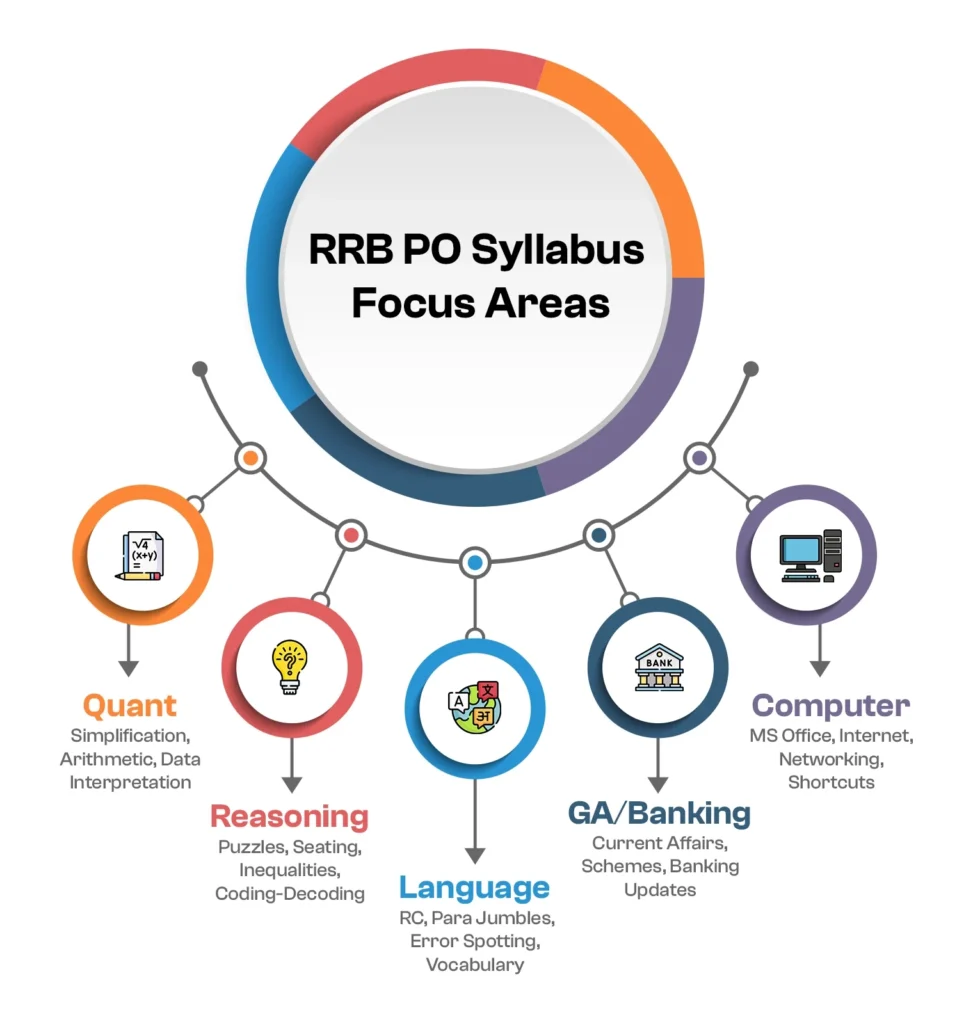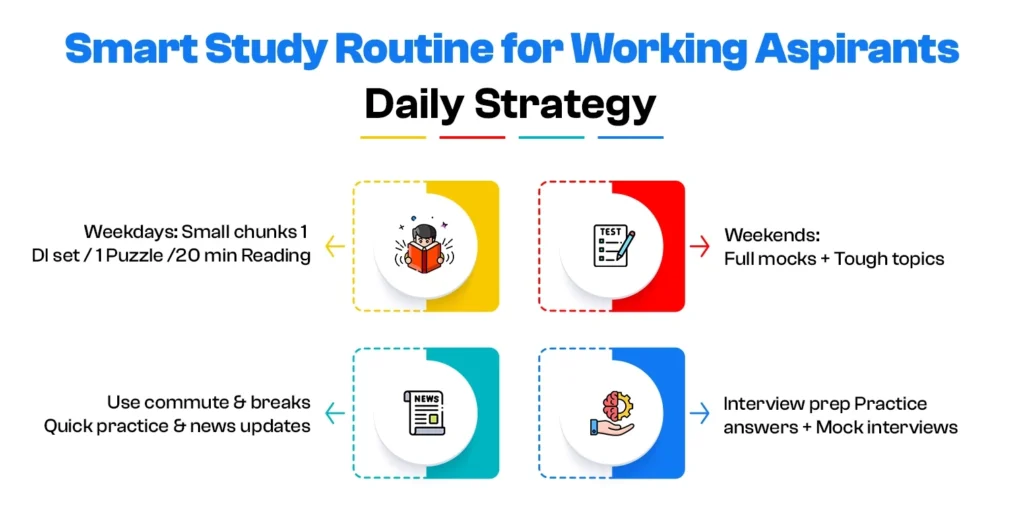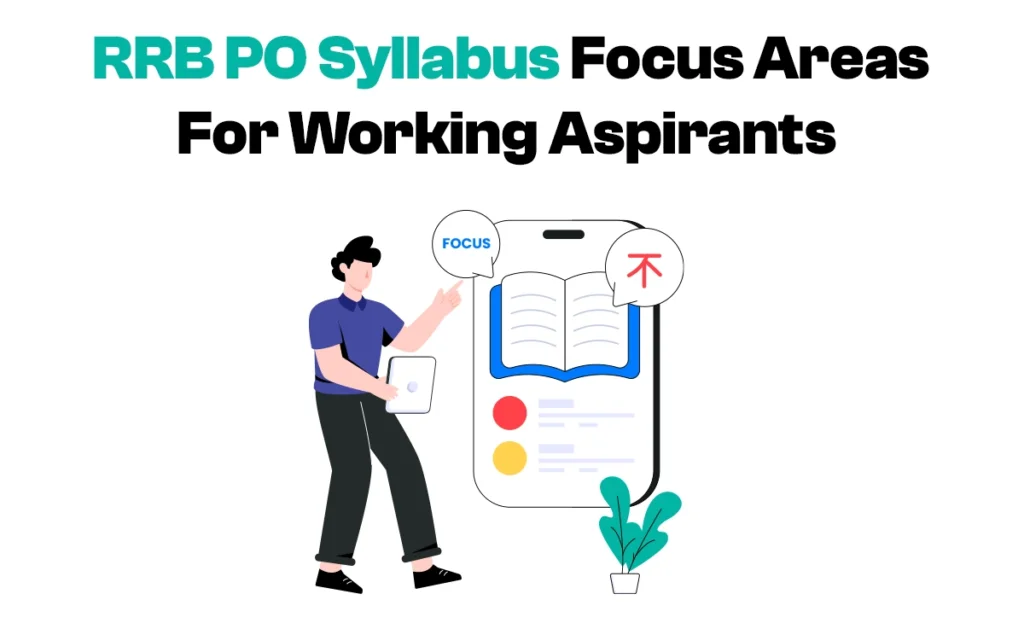When you work a 9-to-5 job and then need to study for your actual dream, especially if that dream is to become an RRB PO, then preparation becomes harder than ever. I know what your life, even with a job, looks like; you have limited hours, your schedules are long, and above all this you have a personal responsibility.
But the news I have for you is that if you know which areas you need to study, which are less frequently asked, and if you are completely familiar with the RRB PO syllabus, then you can prepare effectively without burning yourself out.
Even if you are a working professional, your preparation will become easy enough when I share the RRB PO syllabus details, along with which topics are more scoring, and how you can plan your daily routine so that it also fits your busy schedule.
First, Understand the RRB PO Exam Pattern
Before you dive into preparation, it’s important to know how the exam is structured. The RRB PO selection process has 3 stages:
- Prelims: Tests Reasoning Ability and Numerical Ability. This is also a qualifying test.
- Mains: Covers Reasoning, Quant, English/Hindi, General Awareness, and Computer Knowledge. In this, marks are counted for the final selection.
- Interview: Focuses on your communication, awareness, and suitability for a banking role.
Now that you know the RRB PO exam structure in detail, I want you to understand the RRB PO syllabus in detail, so that you can figure out your strengths and weaknesses.
RRB PO Syllabus: Focus Areas
As most of you working aspirants do not have all day to prepare for the exam, I have collated a list of important topics and areas under each subject for you to put your entire focus on:
1. Quantitative Aptitude
- Prelims: Questions are usually from Simplification, Approximation, Number Series, Arithmetic (like Ratio, Percentage, Profit & Loss), and Data Interpretation.
- Mains: The same areas reappear, but with tougher Data Interpretation sets and additional topics like Data Sufficiency, which requires solving of complex questions.
For those with a packed schedule, it helps to practise 4 – 5 arithmetic problems or one DI set every day. Small but consistent efforts build speed and accuracy.
2. Reasoning Ability
Expect puzzles, seating arrangements, inequalities, coding-decoding, blood relations, and direction sense. In mains, you may also see critical reasoning and machine input/output.
You need to practice at least 10 – 15 questions after you have solved a lesson. As a working aspirant, try solving one puzzle daily during short breaks or while commuting. Even 15 minutes a day can keep topics in your mind refreshed.
3. Language (English/Hindi)
You need to practice Reading Comprehension, Para Jumbles, Error Spotting, and Fill in the Blanks on the days that you’ve allotted for the language section. Do not ignore it, as it is a scoring magnet.
The simplest way to prepare is by reading daily newspapers, banking articles, or short editorials. Just 20 minutes a day improves vocabulary, grammar, and comprehension, all at once, and it will also help you in your GA practice.
4. General Awareness and Banking Knowledge
It includes current affairs, government schemes, banking updates, insurance, and static GK.
If you’re already in a job, use that to your advantage. Follow news updates on your phone, note down anything banking-related, and revise those notes on weekends. That way, you’re preparing even during short breaks.

5. Computer Knowledge
The computer section covers basics like MS Office, Internet, Networking, Number System, and shortcuts. Most working professionals already use computers daily, so the key is to practise targeted question sets to align with the exam pattern.
You need to practice these daily as well. Make a proper timetable and then study accordingly.
6. Interview Preparation
I have seen most students panic over the interview stage, whether they are working or not. But let me tell you that for this stage, all you need is confidence and honesty.
Confidence in answering each question with ease and honesty, so that when you don’t know the answer to something, you can say that with honesty. You should prepare answers for why you want to join as an RRB, how your skills can help rural banking, and your long-term career goals.
To help yourself in answering these questions, I suggest that you give as many mock interviews as you can.

Final Thoughts
So, finally, I would like to end on the note that preparation for the RRB PO syllabus while managing a full-time job is absolutely manageable.
As I have explained above, you do not need to cover everything; you need to only focus on high-scoring topics and subjects, and prepare them with consistency. Although you can create your own timetable, I suggest that many of my friends even agree that you start with Quant and Reasoning for prelims, then move gradually towards Language, General Awareness, and Computer Knowledge for mains. And practice as much as you can.
With consistent effort, a smart plan, and a focus on key areas, each one of you can crack the RRB PO exam, whether you are working a 9 – 5 job or not.

Lexy Summer is a talented writer with a deep passion for the art of language and storytelling. With a background in editing and content creation, Lexy has honed her skills in crafting clear, engaging, and grammatically flawless writing.



